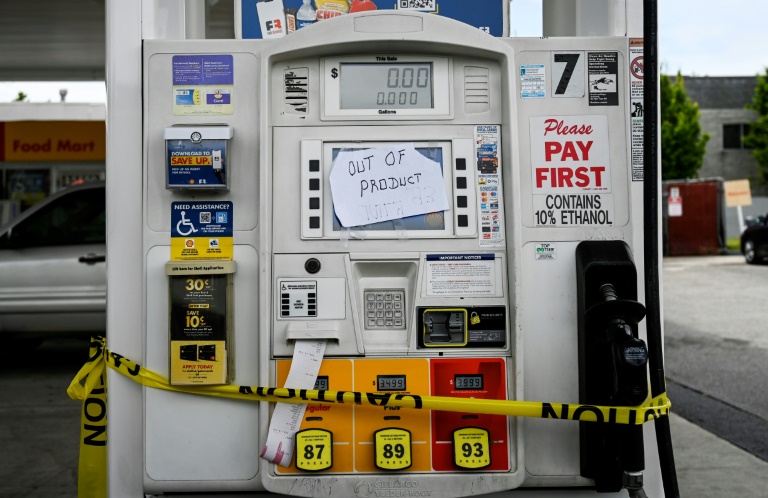
WASHINGTON - The major US pipeline network shut down by a cyber attack said Thursday it has resumed fuel deliveries, but gas stations up and down the east coast were still facing shortages after a wave of panic buying.
President Joe Biden hailed the "good news" and urged Americans to remain calm as supplies are restored over the next few days.
While "we'll not feel the effects at the pump immediately," there will be a "return to normalcy beginning this weekend and continuing in the next week," Biden told reporters at the White House.
Frantic motorists from Florida to Maryland had lined up at gas stations trying to fill their tanks and other containers, and the surge in demand sent the national average price above $3 a gallon for the first time since late 2014 despite government efforts to ease the supply crunch.
Colonial Pipeline said early Thursday said it had "made substantial progress" in resuming deliveries after announcing on Wednesday it had initiated the restart to its network.
The statement said "product delivery has commenced in a majority of the markets we service. By mid-day today, we project that each market we service will be receiving product from our system."
Some lines, including those in Virginia, will not see supplies return until later in the day, the company said.
More than half of the gas stations in Virginia had run out of fuel after the rush of customers drained their tanks, according to data Thursday from the GasBuddy tracking site.
- 'Don't panic' -
Georgia and South Carolina were facing a similar level of shortages, and the nation's capital was running dry, with 73 percent of stations on empty, and 68 percent in North Carolina, according to the data.
About a third of the stations in Florida, Maryland and Tennessee were out.
"I know seeing lines at the pumps or gas stations with no gas can be extremely stressful, but this is a temporary situation. Do not get more gas than you need," Biden said. "Don't panic."
Colonial Pipeline shut down its network following a ransomware attack on its computer systems late Friday.
According to a report by Bloomberg, the company paid a $5 million ransom to the hackers, contradicting a Washington Post report saying it would not pay to release its systems.
A company spokesman declined to comment on the reports given the ongoing investigation into the cyber attack.
Biden also declined to comment on whether the company should pay the ransom, but stressed the need for companies to beef up their IT security.
"This event is providing an urgent reminder of why we need to harden our infrastructure, and make it more resilient against all threats, natural and manmade," he said.
Washington believes the DarkSide criminal group based in Russia targeted the company, and on Wednesday, Biden unveiled a new executive order to improve US cybersecurity, which among other functions compels companies to communicate in the event of such breaches.
The Colonial Pipeline attack follows two other major cybersecurity breaches -- the SolarWinds hack that compromised thousands of US government and private sector computer networks and was officially blamed on Russia; and a potentially devastating penetration of Microsoft email servers.
Colonial Pipeline operates the largest fuel conduit system in the United States, which sends gasoline and jet fuel from the Gulf Coast of Texas to the populous east coast through 5,500 miles (8,850 kilometers) of ducts that serve 50 million consumers.
The government has temporarily waived clean air regulations and rules on shipping and trucking to help get fuel to the affected areas quickly.
"Now things are cooling off with some improvement," GasBuddy oil analyst Patrick De Haan said on Twitter, but cautioned, "The progress may be slow."
De Haan warned that prices could stay high for some time, especially as the Memorial Day holiday weekend approaches -- the traditional start to the American summer travel season.
"The situation will definitely take time and slowly improve due to a high number of outages and higher number of stations to refuel," he said.